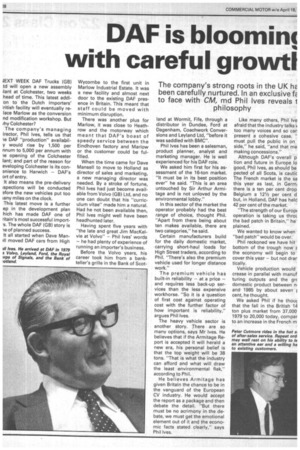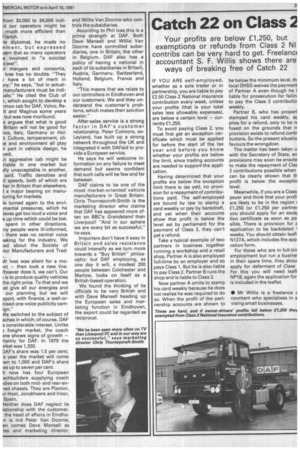DAF is bloomini with careful growiti
Page 30

Page 31

If you've noticed an error in this article please click here to report it so we can fix it.
JEXT WEEK DAF Trucks (GB) td will open a new assembly ,lant at Colchester, two weeks head of time. This latest addion to the Dutch importers' ritish facility will eventually relace Marlow as the conversion nd modification workshop. But thy Colchester?
The company's managing irector, Phil Ives, tells us that DAF "production" availabily would rise by 1,500 per nnum to 5,000 per annum with le opening of the Colchester lant; and part of the reason for eveloping Colchester is its conanience to Harwich DAF's art of entry.
It also means the pre-delivery rspections will be conducted afore the new vehicles put too any miles on the clock.
This latest move is a further ep in the development plan hich has made DAF one of -itain's most successful imports. The whole DAF (GB) story is ie of planned success.
It all started when Dave Mandl moved DAF cars from High
ill Ives. He arrived at DAF in 1979 a Volvo, Leyland, Ford, the Royal )rps of Signals, and the Bank of :otiand. Wycombe to the first unit in Marlow Industrial Estate. It was a new facility and almost next door to the existing OAF presence in Britain, This meant that staff could be moved with minimum disruption.
There was another plus for Marlow, it was close to Heathrow and the motorway which meant that DAF's boast of speedy service between the Eindhoven factory and Marlow or the customer could be fulfilled.
When the time came for Dave Mansell to move to Holland as director of sales and marketing, a new managing director was needed. By a stroke of fortune, Phil Ives had just become available from Volvo (GB) Ltd, and no one can doubt that his "curriculum vitae" made him a natural. Had he not been available then, Phil Ives might well have been headhunted later.
Having spent five years with "the late and great Jim MacKelvie at Volvo" Phil Ives' words he had plenty of experience of running an importer's business.
Before the Volvo years, his career took him from a bankteller's grille in the Bank of Scot
land at Wormit, Fife, through a distributor in Dundee, Ford at Dagenham, Coachwork Conversions and Leyland Ltd, "before it was saddled with BMC".
Phil Ives has been a salesman, product planner, analyst and marketing manager. He is well experienced for his DAF role.
We asked him first for his assessment of the 16-ton market. "It must be in its best position ever" he said. "This is an area untouched by Sir Arthur Armitage and is not unloved by the environmental lobby."
In this sector of the market the operator probably had the best range of choice, thought Phil. "Apart from there being about ten makes available, there are two categories," he said.
Certain manufacturers build for the daily domestic market, carrying short-haul loads for High Street traders, according to Phil. "There's also the premium vehicle used for longer distance work."
The premium vehicle has built-in reliability at a price and requires less back-up services than the less expensive workhorse. "So it is a question of first cost against operating cost with the further factor of how important is reliability," argues Phil Ives.
The heavy vehicle sector is another story. There are so many options, says Mr Ives. He believes that if the Armitage Report is accepted it will herald a new era, his personal belief is that the top weight will be 38 tons. "That is what the industry can afford and what will draw the least environmental flak," according to Phil.
He believes Armitage has given Britain the chance to be in the vanguard of the European CV industry. He would accept the report as a package and then debate the detail. "But there must be no acrimony in the debate, we must get the emotional element out of it and the economic facts stated clearly," says Phil Ives. Like many others, Phil lye afraid that the industry talks N, .too many voices and so can present a cohesive case. must pull the public in on side," he said, "and that me making concessions."
Although DAF's overall p tion and future in Europe lo good, Phil Ives, as should be pected of all Scots, is cautic The French market is the sa this year as last, in Germ. there is a ten per cent drop Belgium a 121/2 per cent d but, in Holland, DAF has held 42 per cent of the market.
"The strength of our Europi operation is taking us throi. the bad patch in Britain," he plained.
We wanted to know when "bad patch" would be over.
Phil reckoned we have hit bottom of the trough now z' the economy will begin to cover this year but not drar tically.
Vehicle production would crease in parallel with manuf turing outputs and the grc domestic product between and 1985 by about seven j cent, he thought.
We asked Phil if he thouc. that the fall in the British 14 ton plus market from 37,000 1979 to 20,000 today, compar to an increase in the French m
from 30,000 to 34,000 indid our operators might be much more efficient than French.
le diplomat, he made no nment, but expressed cern that so many operators e involved in "a suicidal s war".
n mergers and consortia, Ives has no doubts. "They have a lot of merit in )ry," he says, "but in actualmanufacturers must be indi„leis.” He cited the Club of r, which sought to develop a imon cab for DAF, Volvo, Reit and Magirus some years but was now moribund.
e argues that what is good Britain will not be good for ice, Italy, Germany or HolJ. Culture, temperament, elite and environment all play ir part in vehicle design, he ued.
,n aggressive cab might be irable in one market but illy unacceptable in another, said. Traffic densities and d speeds, both of which are her in Britain than elsewhere, i a major bearing on menuluring for markets.
le turned again to the envi!mental pressures, which he ieves get too loud a voice and e up time which could be betspent in other directions. ny people were ill-informed, : there was no central voice mking for the industry. We ;ed about the Society of Itor Manufacturers and Trad Or Ives was silent for a mo nt then took a new line. fhoever does it, we can't. Our ) is to produce quality vehicles the right price. To that end we lst give all our energies and our planning but we will pport, with finance, a well-ornised one voice publicity camign."
Ne switched to the subject of aches in which, of course, DAF s considerable interest. Unlike 3 freight market, the coach 3ne shows signs of growth — rtainly for DAF. In 1979 the 3rket was 1,330.
DAF's share was 1.5 per cent; s year the market will come wn to 1,000 and DAF's share les up to seven per cent.
It now has four European achbuilders supplying coach dies on both midand rear-en-led chassis. They are Plaxton, In Hool, Jonckheere and Irizor, Spain.
Neither does DAF neglect its lationship with the customer. the head of affairs in Eindhon is md Peter Van Doorne, en comes Dave Mansell as les and marketing director, and Willie Van Doorne who controls the subsidiaries.
According to Phil Ives this is a prime strength at DAF. Both Dave Mansell and Willie Van Doorne have controlled subsidiaries, one in Britain, the other in Belgium. DAF also has a policy of having a national in each of its subsidiaries in Britain, Austria, Germany, Switzerland, Holland, Belgium, France and Italy.
"This means that we relate to our controllers in Eindhoven and our customers. We and they understand the customer's problems, which makes their solution easier."
After-sales service is a strong factor in DAF's customer relationship. Peter Cutmore, exLeyland, has built up a strong network throughout the UK and integrated it with DAFaid to provide a European service.
He says he will welcome information on any failure to meet demand but seems confident that such calls will be few and far between.
DAF claims to be one of the most market-oriented vehicle manufacturers in Great Britain. Chris Thorneycroft-Smith is the marketing director who claims that DAF has appeared more often on BBC's Grandstand than Liverpool! "And in our sphere we are every bit as successful," he says.
Importers don't have it easy in Britain and sales resistance could intensify as we turn more towards a "Buy British" philosophy; but DAF employing, as one day it will, a modest 200 people between Colchester and Marlow, looks on itself as a British-based operation.
We found the thinking of its officials to be very British and with Dave Mansell heading up the European sales and marketing function in Eindhoven, the export could be regarded as reciprocal.




















































































